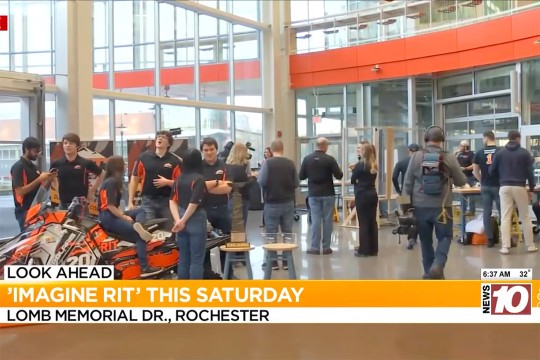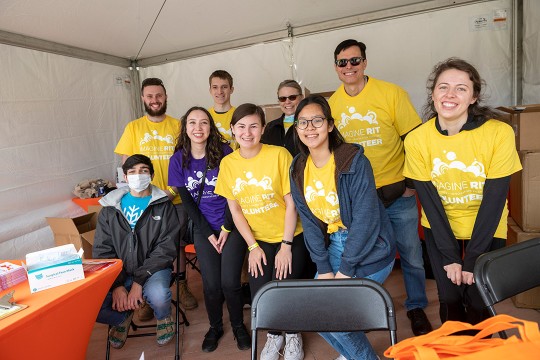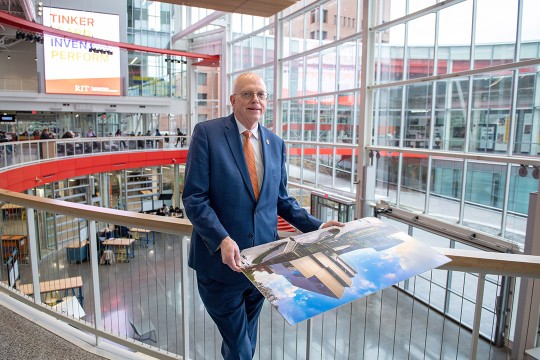RIT DEAF GRAD HIRED TO SERVE
“David is one of the first deaf campus safety officers hired full time, but certainly not the last,” said Robert Craig, director, RIT's Campus Safety Department. “For months, we’ve had students who are deaf or hard of hearing serve on the staff, and have since learned ways to better serve the growing deaf and hard-of-hearing population on campus through assistive devices and by using current technologies such as pagers that offer immediate communication to dispatch.”
More than 1,300 deaf and hard-of-hearing students, faculty and staff are on campus.
Reekers’ duties are the same as other campus safety officers. He can be found patrolling the area around RIT's National Technical Institute for the Deaf (NTID), as well as working special events on and off campus.
A 2000 graduate of RIT’s Criminal Justice program, Reekers served as vice president of Kappa Phi Theta Fraternity, participating in many community service fundraisers, and earning Brother of the Year and Executive Board of the Year honors. He also worked on the Student Life Team as a development educator, coordinating different workshops and panels to discuss various campus community issues.
“We’re looking forward to David helping us identify new assistive technologies, to continually find ways to better serve our constituents, including the greater Rochester area” Craig said.
“With a deaf campus safety officer, members of the NTID community have the comfort of being able to collaborate with someone without having to face obstacles in communication and feel a sense of unity in trying to build a community where we can feel safely at home,” said Chris Sano, a software development and management graduate student, who is deaf.
But marketing student Jennifer Carrigan, who also is deaf, doesn’t think having a deaf campus safety officer, whom she says is incapable of communication with a majority of RIT’s population, is a good idea.
"I’m concerned with my own safety; and for me to feel safe, I need to know that the officers are able to communicate with each other in emergencies, and to communicate with the students on campus,” Carrigan said. “I’d much rather they hired someone who was bilingual—able to communicate verbally and in sign. The deafness isn’t an issue with me.”
But Reekers characterizes himself as bilingual, and that his use of AOL technologies and Instant Messenger further alleviates communication barriers, because there's only a 15-second lapse in sending and receiving messages.
"Even if other officers do not understand me, there's always the good old-fashioned way of paper and pen, which works 100 percent effectively," Reekers said. “All of us, hearing and deaf have an opportunity to learn how to communicate better with each other.”
Reekers believes he brings a balance to the Campus Safety staff. “There are many hearing officers who haven’t established a solid foundation of sign language yet.”
“It is critical that RIT shows the students that deafness is understood,” said information technology student Thomas Clark, who is deaf. “By hiring a deaf campus safety officer, RIT is ignoring the stigma and misunderstandings of the greater hearing community, and affirming that there IS a place for deafness here at RIT.”
NTID's Associate Dean of Student Affairs Gerard Buckley agrees.
"Reekers' hiring by Campus Safety represents RIT's commitment to the very reason and mission of why NTID was established in the first place," Buckley said. "We believe that this represents a significant step in enhancing the NTID/RIT deaf student community's access to Campus Safety services."
It's not just a good GPA or involvement in extra curricular activities that makes a good employee, Craig said.
"During his initial interview, David said in sum and substance that any success he has enjoyed was a result of what the deaf community did to support him. Accordingly, David said he was looking for a career that allows him to give back to such a supportive community," Craig said. "I thought that was very powerful and spoke volumes about his character."
The first and largest technological college in the world for deaf and hard-of-hearing students, NTID offers educational programs and access and support services to the 1,100 deaf and hard-of-hearing students on RIT’s Rochester, N.Y. campus. For further information, visit our web page at: http://www.rit.edu/NTID.For more NTID news go to http://www.rit.edu/ntid/newsroom














